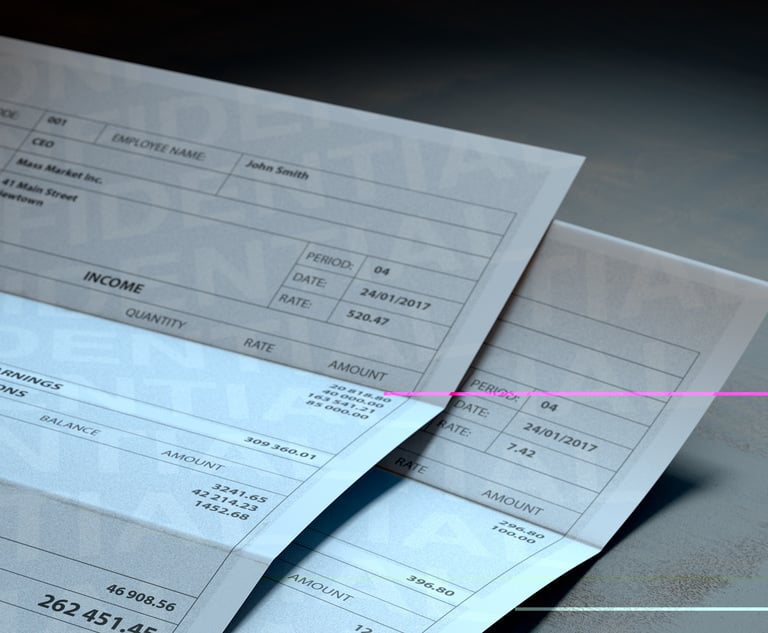Defeat of Embraer Class Action Highlights the Uphill Path in Securities Suits
On each point raised by the plaintiffs, U.S. District Judge Richard Berman cited recent case law that showed the challenges facing litigants in class action securities cases.
April 03, 2018 at 05:30 PM
5 minute read

A recent win by Skadden, Arps, Slate, Meagher & Flom in defeating a class action suit against Brazilian aerospace conglomerate Embraer, which acknowledged global bribery allegations as part of a deferred prosecution agreement with U.S. investigators in October 2016, served as a good snapshot of the recently evolved set of challenges faced by those seeking to bring a federal class securities action in the Southern District of New York.
In Employees Retirement System of the City of Providence v. Embraer, 16-cv-06277, the plaintiffs, represented by Pomerantz, alleged the company and its top officers violated a number of securities laws and rules. The source of the violations during the class period from early January 2012 to late November 2016 centered on Embraer's violation of the Foreign Corrupt Practices Act.
The company would admit in October 2016 that, between 2007 and 2011, several high-level executives helped bribe government officials in the Dominican Republic, Saudi Arabia, Mozambique and India to the tune of $11.5 million. In exchange, the company received contracts worth more than $83 million in profits, according to court papers.
In their complaint, the plaintiffs alleged a number of ways in which Embraer failed to adhere to securities rules. In each, U.S. District Judge Richard Berman of the Southern District of New York pointed to the state of securities pleadings to nullify the arguments.
To begin with, the plaintiffs argued that the company was “duty bound” of the “certainty of the fraud” once the government's investigations began—a premise, as the defendants called it, that the company admit to wrongdoing “before it had even been charged and before the investigations were even complete.”
Berman agreed, pointing to two recent cases. In the U.S. Court of Appeals for the Second Circuit's 2014 decision in City of Pontiac Policemen's System v. UBS, the court held that “disclosure is not a rite of confession, and companies do not have a duty to disclose uncharged, unadjudicated wrongdoing.” Likewise, in a suit as part of the long-standing securities litigation tied to the Petrobras public corruption scandal, the district court in September 2017 found in In re Banco Bradesco S.A. Securities Litigation that the bank had disclosed enough when it acknowledged that investigations were happening and a negative outcome could happen—just as Embraer had.
The plaintiffs' argument that the company was obligated to disclose that some of its money was received because of bribes was also unavailing. In In re Sanofi Securities Litigation, the pharmaceutical company was sued for not flagging the financial benefits of its illegal marketing and kickback scheme. Citing the district court's September 2016 decision, Berman found that, absent an allegation that the financial statements were actually false, it's not a securities violation.
An attempt to hold Embraer liable for its own internal codes of ethics similarly failed. Another district case tied to the Petrobras scandal, In re Braskem SA Securities Litigation, involved a company that had rules that forbade bribery, yet it was accused of doing just that. Quoting from the Ninth Circuit's January 2017 decision in Retail Wholesale v. Hewlett-Packard, the district court held that “a code of ethics is inherently aspirational,” adding that, absent more than an “undisclosed breach of this standard of conduct,” breaking your own rules is “not actionable under securities laws.”
The plaintiffs also challenged Embraer's stated belief that it didn't need to estimate reserves for the investigation into its conduct—even as the company ended up paying $945.3 million in fines and disgorgement. Berman turned to the U.S. Supreme Court's landmark 2015 decision in Omnicare v. Laborers District Council Construction Industry Pension Fund. A claim cannot be stated simply because an opinion is wrong, Berman noted, and here Embraer's opinion about reserves was based on advice from outside counsel.
“Plaintiff does not plead that this statement was (insincerely) not truthful or that management (and its outside counsel) did not believe what they were stating publicly,” the judge wrote.
Lastly, Embraer was accused of not maintaining adequate internal controls, namely because even after the DPA went into effect, at least one senior executive with oversight responsibility for the employees engaged in illegal activity remained employed and undisciplined. Two relevant district decisions from 2015 were noted—In re Petrobras Securities Litigation, which found less particularized claims sufficient to proceed, and In re PetroChina Securities Litigation, in which the lack of particularity doomed the claim.
Berman found that the PetroChina case was the more similar of the two.
“Plaintiff, in the instant case, relies exclusively upon general assertions about Embraer's internal controls—and tortuously (and unpersuasively) tries to relate them to the fact that some current Embraer employees knew about or participated in (publicly disclosed) pre-class period bribery at various points between 2004 to 2011,” he wrote.
Berman granted, then, the defendant's motion to dismiss with prejudice.
Pomerantz partner Jeremy Lieberman, who led the plaintiffs' legal team, agreed that “the courts are struggling” with many of these securities-related issues. But from his perspective, there's just as much good law that sides with his clients as not. He pointed to the recent revival of the lawsuit against Alibaba Group Holding Ltd. by the Second Circuit last year, and the 2014 dismissal by the same circuit of the securities suit against JinkoSolar, as offering different views on company's liabilities when it comes to disclosing wrongdoing.
“Yet somehow the district courts, and even sometimes the court of appeals, are coming up with divergent points of view,” he said, adding that he respectfully disagreed with Berman's decision and is considering appeal with his client.
Embraer's defense team from Skadden included partners Jay Kasner, Christopher Malloy and Scott Musoff. The firm did not return a request for comment.
This content has been archived. It is available through our partners, LexisNexis® and Bloomberg Law.
To view this content, please continue to their sites.
Not a Lexis Subscriber?
Subscribe Now
Not a Bloomberg Law Subscriber?
Subscribe Now
NOT FOR REPRINT
© 2025 ALM Global, LLC, All Rights Reserved. Request academic re-use from www.copyright.com. All other uses, submit a request to [email protected]. For more information visit Asset & Logo Licensing.
You Might Like
View All
Five Years After Vega Much Remains Unsettled in Pay Frequency Litigation

Spotify GC Steps Down, Opts to 'Step Away From Full-Time Corporate Life'
2 minute read
Dechert Sues Former Attorney For Not Returning Compensation

Trending Stories
Who Got The Work
J. Brugh Lower of Gibbons has entered an appearance for industrial equipment supplier Devco Corporation in a pending trademark infringement lawsuit. The suit, accusing the defendant of selling knock-off Graco products, was filed Dec. 18 in New Jersey District Court by Rivkin Radler on behalf of Graco Inc. and Graco Minnesota. The case, assigned to U.S. District Judge Zahid N. Quraishi, is 3:24-cv-11294, Graco Inc. et al v. Devco Corporation.
Who Got The Work
Rebecca Maller-Stein and Kent A. Yalowitz of Arnold & Porter Kaye Scholer have entered their appearances for Hanaco Venture Capital and its executives, Lior Prosor and David Frankel, in a pending securities lawsuit. The action, filed on Dec. 24 in New York Southern District Court by Zell, Aron & Co. on behalf of Goldeneye Advisors, accuses the defendants of negligently and fraudulently managing the plaintiff's $1 million investment. The case, assigned to U.S. District Judge Vernon S. Broderick, is 1:24-cv-09918, Goldeneye Advisors, LLC v. Hanaco Venture Capital, Ltd. et al.
Who Got The Work
Attorneys from A&O Shearman has stepped in as defense counsel for Toronto-Dominion Bank and other defendants in a pending securities class action. The suit, filed Dec. 11 in New York Southern District Court by Bleichmar Fonti & Auld, accuses the defendants of concealing the bank's 'pervasive' deficiencies in regards to its compliance with the Bank Secrecy Act and the quality of its anti-money laundering controls. The case, assigned to U.S. District Judge Arun Subramanian, is 1:24-cv-09445, Gonzalez v. The Toronto-Dominion Bank et al.
Who Got The Work
Crown Castle International, a Pennsylvania company providing shared communications infrastructure, has turned to Luke D. Wolf of Gordon Rees Scully Mansukhani to fend off a pending breach-of-contract lawsuit. The court action, filed Nov. 25 in Michigan Eastern District Court by Hooper Hathaway PC on behalf of The Town Residences LLC, accuses Crown Castle of failing to transfer approximately $30,000 in utility payments from T-Mobile in breach of a roof-top lease and assignment agreement. The case, assigned to U.S. District Judge Susan K. Declercq, is 2:24-cv-13131, The Town Residences LLC v. T-Mobile US, Inc. et al.
Who Got The Work
Wilfred P. Coronato and Daniel M. Schwartz of McCarter & English have stepped in as defense counsel to Electrolux Home Products Inc. in a pending product liability lawsuit. The court action, filed Nov. 26 in New York Eastern District Court by Poulos Lopiccolo PC and Nagel Rice LLP on behalf of David Stern, alleges that the defendant's refrigerators’ drawers and shelving repeatedly break and fall apart within months after purchase. The case, assigned to U.S. District Judge Joan M. Azrack, is 2:24-cv-08204, Stern v. Electrolux Home Products, Inc.
Featured Firms
Law Offices of Gary Martin Hays & Associates, P.C.
(470) 294-1674
Law Offices of Mark E. Salomone
(857) 444-6468
Smith & Hassler
(713) 739-1250






